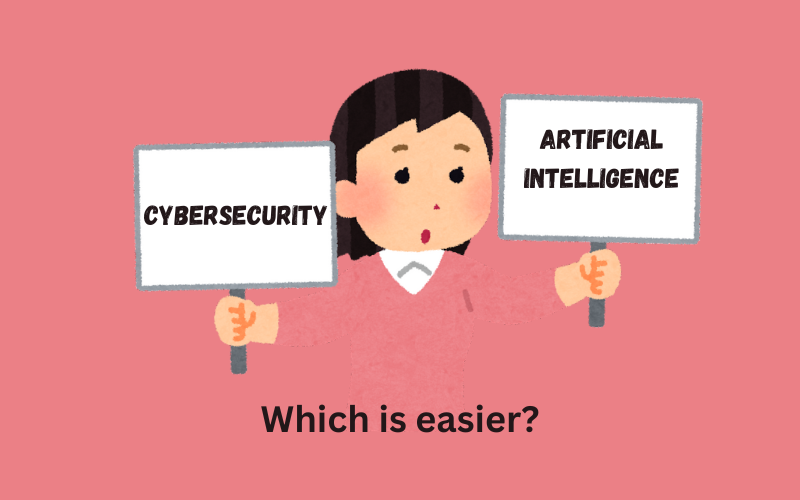Are you wondering which is easy: cybersecurity or artificial intelligence? Both are popular fields in today’s world, but they are very different. Cybersecurity focuses on protecting information from online dangers, while artificial intelligence is about teaching machines to think and learn like humans. If you want a job that’s easier to start with and gives quick hands-on skills, cybersecurity may be the better choice. But if you enjoy puzzles, numbers, and building smart systems, AI could be worth the challenge. Let’s explore both fields to see which fits you best.
What is cybersecurity?
Cybersecurity is all about keeping your personal and business information safe from online threats. As more people use the internet and store data online, it has become more important than ever to protect that information. Whether it’s your passwords, bank details, or work files, cybersecurity helps make sure that no one can steal or misuse them. It’s like having a digital lock on your important data.
What is artificial intelligence(AI)?
Artificial Intelligence, or AI, means making machines that can think and learn like humans. It’s about teaching computers to do things that usually need human brainpower, like understanding speech, making decisions, or recognizing pictures. You can already see AI in things like voice assistants, self-driving cars, and smart apps. The goal of AI is to help machines solve problems and get smarter over time by learning from data.
Principles of cybersecurity and AI
Principles of Cybersecurity
Cybersecurity is about keeping your data and online systems safe from unwanted access. It’s like putting a strong lock on your digital doors.
- Privacy Comes First
Only the right people should see your personal or work data. It’s like locking your phone so no one else can read your messages. - Keep It Real and Accurate
Your data should stay the same unless you change it on purpose. Imagine someone changing your bank balance without your permission, that’s what cybersecurity tries to stop. - Always Available
Your files, apps, or emails should be easy to reach when you need them. If your email is down, it can delay work; that’s why this rule matters. - Know the Risks
Every online system has weak spots. The key is to find and fix them before hackers do. According to IBM, human error causes over 90% of cybersecurity issues — showing how important awareness is. - Stay Updated
Cyber threats change fast. So, it’s important to keep software and habits up to date. Think of it like changing your house keys if you lose them.
Principles of Artificial Intelligence (AI)
AI is about making machines smart enough to do tasks like humans — sometimes even better.
- Learn From Experience
AI improves with more data, just like people get better by practicing. For example, the more pictures an app sees, the better it gets at recognizing faces. - Understand and Respond
Some AI systems can read and reply in human language. If you’ve ever used Siri or Google Assistant, you’ve seen this in action. - See and Think
AI can also look at pictures and make sense of them. Self-driving cars use this to detect signs, roads, and people. - Solve Problems
AI can make decisions based on patterns. For example, it might suggest what movie you’ll enjoy based on your past choices. - Act on Its Own
Some AI systems work without human help, like robots in factories or chatbots that answer questions online.
As per a McKinsey report, AI could add up to $13 trillion to the global economy by 2030, showing how powerful and useful it is becoming.
Comparison of cybersecurity and artificial intelligence
Learning Curve: Which Field Is More Beginner-Friendly?
When it comes to choosing a career, many people wonder: cyber security vs artificial intelligence career, which one is easier to start with? Both fields are exciting, but they have different learning paths.
Cybersecurity is often seen as more beginner-friendly. It starts with learning how to protect data and online systems from attacks. If you understand how computers and the internet work, you’re already off to a good start. There are many beginner courses available that teach basic skills. You can also earn certificates that help you grow, like CompTIA Security+. Hands-on practice is key. It’s about learning how to stop real problems — like someone trying to break into your computer.
As Jeh Johnson wisely said:
“Cybersecurity is a shared responsibility, and it boils down to this: In cybersecurity, the more systems we secure, the more secure we all are.”
This shows how teamwork and learning the basics can make a big impact.
On the other hand, Artificial Intelligence (AI) has a steeper learning curve. It often starts with math and coding. You’ll need to learn how to write programs and understand how machines can “learn” from data. Python is the most common language used. You’ll also dive into areas like pattern recognition and decision-making. While AI is powerful and full of potential, it takes more time to get comfortable with it — especially for those new to programming.
So, if you’re just starting and want quicker results, cybersecurity might be the easier path. It gives you more chances to practice real-world skills early on. But if you enjoy working with numbers and solving puzzles, AI can be worth the challenge.
In the debate of cyber security vs artificial intelligence career, it really depends on your interest. Cybersecurity helps protect the world, while AI helps shape the future. Both are important — just pick the one that fits your style of learning.
Technical Skills Required: Cyber Security vs Artificial Intelligence Career
If you’re trying to choose between a cyber security vs artificial intelligence career, it’s helpful to look at the skills each field needs.
Cybersecurity is about protecting systems and information. To get started, you should know how computers and networks work. Many people in this field learn how to spot problems and stop them before they cause harm. You don’t need to be great at math, but you should enjoy solving problems and thinking carefully. You also need to keep learning, because new online threats appear often. Basic coding can help too, but it’s not the main focus.
Artificial Intelligence (AI) is a bit more complex. It’s about teaching machines to learn and make smart decisions. To work in AI, you need to be comfortable with numbers and logic. You’ll also need to learn coding, especially in Python. This field is great for people who enjoy patterns, puzzles, and working with data. You’ll spend time building smart systems like chatbots or tools that can guess what comes next.
As Dave Waters said:
“Predicting the future isn’t magic, it’s artificial intelligence.”
This shows how AI uses data to make smart guesses about what might happen next.
In short, cybersecurity needs strong focus and quick thinking, while AI needs more math and programming. Think about what you enjoy more — protecting systems or building smart tools. That will help you choose the right path.
Job Roles and Responsibilities: Which Demands More Complexity?
When comparing a cyber security vs artificial intelligence career, both fields offer many job roles, but their complexity differs.
In cybersecurity, jobs like Security Analyst or Penetration Tester focus on stopping threats and protecting systems. These roles often need quick action and strong decision-making. Higher-level roles, like a security leader, involve managing teams and making big safety plans. Most tasks are based on real-time issues, requiring constant attention and updates.
In AI, roles such as Machine Learning Engineer or AI Researcher involve building smart tools that learn and improve over time. These jobs often deal with large sets of data and long research processes. AI roles usually demand more planning, testing, and deep thinking. Creating new systems or models can take months and may involve trial and error.
2025 Research shows that AI jobs often need more advanced math and longer development cycles, while cybersecurity jobs demand fast responses and a clear understanding of risks. So, if you prefer real-time problem-solving, cybersecurity might suit you better. But if you enjoy building and testing smart systems over time, AI could be your path.
Real-World Projects (By Professionals)
Cybersecurity:
A cybersecurity team at a U.S. hospital faced a ransomware attack. Hackers tried to lock patient records and demand money. The team quickly isolated the infected systems. They used backup data and restored access without paying the hackers. One big challenge was keeping the hospital running during the fix. This project showed how fast thinking and planning can protect lives.
Artificial Intelligence:
Engineers at a farming tech company used AI to help tomato farmers. They trained a drone system to scan plants and spot diseases early. The challenge was teaching the system to tell the difference between healthy and sick leaves. They used thousands of plant images and simple color patterns. This project helped farmers save crops and reduce waste.
Which field is easier and better: Cybersecurity or Artificial Intelligence?
Both fields are good and have many jobs. Cybersecurity is about keeping data safe. It can be easier if you like protecting things. Artificial Intelligence is about making smart machines. It can be harder because it needs a lot of learning.
In salary, both pay well. Cybersecurity jobs can earn around $80,000 to $120,000 a year. AI jobs often pay a bit more, about $90,000 to $130,000 a year.
Choose the one you enjoy more. Both fields offer good money and chances to grow.
Conclusion: Which Is Easier Depends on Your Background?
So, which is easier: cybersecurity or artificial intelligence? Cybersecurity is often easier to begin because it focuses on protecting data and systems with practical skills you can learn quickly. It suits people who like fast problem-solving and teamwork. AI takes more time to learn, needing math, coding, and patience to build smart machines. Both fields pay well, cybersecurity jobs earn around $80,000 to $120,000 a year, while AI roles often pay slightly more. In the end, choose the one that matches your interests and learning style. Whether protecting the digital world or creating the future with smart technology, both careers offer great growth and rewards.

